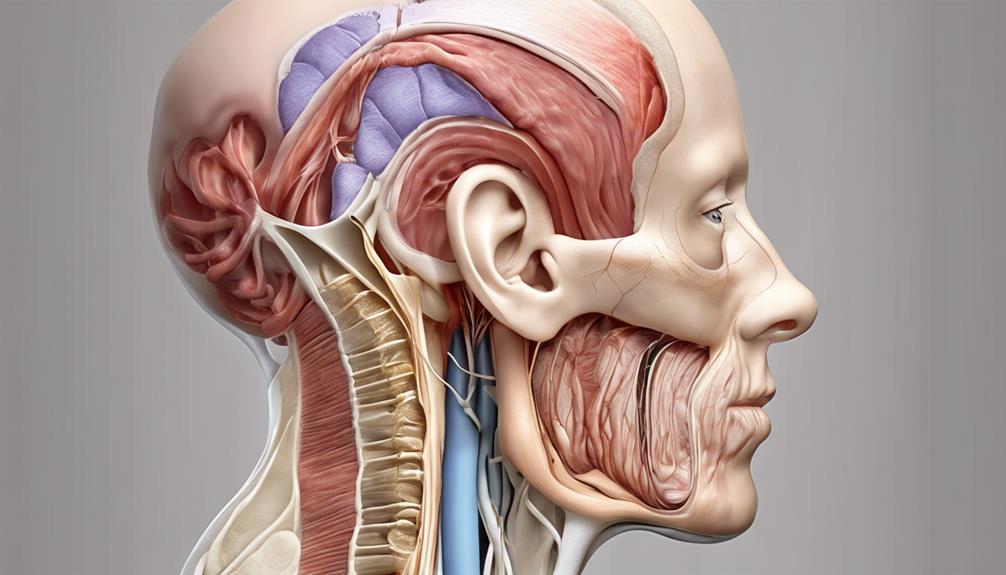Navigating the complex realm of high-frequency hearing loss and tinnitus, we have stumbled upon a wealth of knowledge that could revolutionize our comprehension and treatment of these auditory challenges.
From unraveling the intricate web of symptoms to unveiling cutting-edge treatment modalities, this comprehensive guide paves the way for a deeper understanding of these conditions.
By unraveling the mysteries surrounding high-frequency hearing loss and tinnitus, we gain valuable insights that can potentially transform our approach to managing these prevalent issues with a newfound clarity and purpose.
Key Takeaways
- Protect ears from loud noises to prevent high-frequency hearing loss.
- Seek audiologist consultation for tinnitus diagnosis and tailored treatment.
- Implement lifestyle changes like stress management for tinnitus symptom relief.
- Consider cognitive behavioral therapy and sound therapy for tinnitus management.
Understanding High-Frequency Hearing Loss
High-frequency hearing loss, which primarily affects our ability to hear sounds above 2,000 Hz, poses challenges in discerning consonants, understanding higher-pitched voices like those of women and children, and perceiving specific environmental sounds. This type of hearing loss can significantly impact communication clarity, especially in noisy environments or when conversing with individuals with softer voices. Diagnosis through an audiogram is crucial, as it typically reveals a characteristic downward slope in hearing sensitivity at higher frequencies, indicating high-frequency hearing loss.
Various factors contribute to high-frequency hearing loss, including aging, noise exposure, genetics, ototoxic medications, and underlying health conditions such as diabetes. Understanding these risk factors is essential for both prevention and early intervention. Prevention strategies play a vital role in mitigating the effects of high-frequency hearing loss, emphasizing the importance of protecting ears from loud noises, limiting exposure to ototoxic substances, and maintaining overall health to preserve optimal hearing function. By implementing these strategies, individuals can reduce the likelihood of developing high-frequency hearing loss and its associated communication challenges.
Causes of High-Frequency Hearing Loss

Damage to sensory hearing cells in the inner ear is a primary factor leading to the development of high-frequency hearing loss. Understanding the causes behind this condition can help individuals take proactive steps to protect their hearing health.
Here are four key factors contributing to high-frequency hearing loss:
- Age-Related Hearing Loss: Gradual deterioration of hearing abilities is a common outcome of aging, affecting the higher frequencies first.
- Noise Exposure: Prolonged exposure to loud noises, either in the workplace or leisure environments, can damage the delicate structures of the inner ear.
- Genetics: Family history plays a significant role in predisposing individuals to high-frequency hearing loss.
- Ototoxic Medications and Medical Conditions: Certain medications and health conditions like diabetes can have adverse effects on hearing, particularly in the higher frequency range.
Diagnosing Tinnitus
When diagnosing tinnitus, healthcare professionals rely on patients' descriptions of the sound, medical history, and physical examinations. Audiologists play a crucial role in evaluating tinnitus through specialized tests such as pure-tone audiometry, which helps assess the severity of hearing loss and potential links to tinnitus. Pitch matching is another valuable technique used by audiologists to determine the frequency of the perceived tinnitus sound, aiding in personalized treatment approaches.
Additionally, masking techniques, residual inhibition testing, and questionnaires are employed to further diagnose tinnitus and evaluate its impact on an individual's quality of life. Objective tests like otoacoustic emissions (OAEs) and auditory brainstem response (ABR) can provide additional confirmation of tinnitus presence, enhancing the diagnostic process.
Managing Tinnitus Symptoms

Successfully managing tinnitus symptoms involves implementing various therapies, stress reduction techniques, and seeking appropriate medical assistance. When it comes to tinnitus management, here are some key strategies to consider:
- Therapy: Cognitive Behavioral Therapy (CBT) can help reframe negative thoughts associated with tinnitus, reducing distress.
- Relaxation Techniques: Practices like mindfulness meditation or deep breathing exercises can alleviate stress and improve tinnitus symptoms.
- Consulting an Audiologist: An audiologist can identify any underlying conditions contributing to tinnitus and provide tailored treatment options.
- Hearing Aids and Specialized Programs: Utilizing hearing aids and participating in specialized tinnitus management programs can significantly mitigate the impact of tinnitus on daily life.
Lifestyle Changes for Tinnitus
Making lifestyle changes can play a significant role in managing tinnitus symptoms effectively. Avoiding triggers like caffeine, alcohol, and smoking can help reduce tinnitus symptoms, while maintaining a healthy diet low in salt and avoiding aspirin can minimize tinnitus aggravation. Regular exercise and stress management techniques can improve overall well-being and lessen the impact of tinnitus. Incorporating sound therapy, such as white noise machines or calming music, can provide relief from tinnitus sounds. Creating a quiet and relaxing environment for sleep can help manage tinnitus symptoms at night.
| Lifestyle Changes | Impact on Tinnitus Symptoms |
|---|---|
| Avoiding Triggers | Reduces tinnitus symptoms' intensity |
| Healthy Diet | Minimizes tinnitus aggravation |
| Exercise | Improves overall well-being and lessens impact |
Frequently Asked Questions
What Is the New Tinnitus Treatment 2023?
In 2023, the new tinnitus treatment involves cutting-edge therapies that effectively manage symptoms. These treatments incorporate innovative sound therapy technologies and personalized plans.
Research into neural stimulation is shaping the future of tinnitus care, focusing on individualized and holistic approaches. The emphasis is on tailoring solutions to each patient's unique needs and conditions, ultimately improving their quality of life.
How Do You Treat Tinnitus and Hearing Loss?
When treating tinnitus and hearing loss, we combine therapies like hearing aids and sound therapy for relief. Prescription hearing aids with tinnitus-masking settings can amplify external sounds and mask internal tinnitus noises.
Specialized programs like Widex Zen Therapy and ReSound Tinnitus Relief App offer customizable sound options for relief. Tailoring interventions based on high-frequency hearing tests can help identify hidden hearing damage.
Early detection is crucial for effective treatment and prevention of worsening symptoms.
What Not to Do When You Have Tinnitus?
When dealing with tinnitus, we must avoid loud noises, cotton swabs in the ears, and excessive caffeine, alcohol, and salty foods.
Ignoring medical conditions like high blood pressure or TMJ disorder can worsen tinnitus symptoms. Smoking should be avoided as it reduces blood flow to the ears.
Taking care of our hearing health means staying away from these triggers and harmful habits to prevent exacerbating tinnitus and high-frequency hearing loss.
When Does Tinnitus Become Unbearable?
When tinnitus becomes unbearable, it significantly impacts daily life and quality of living. Around 20% of tinnitus patients experience severe distress due to symptoms. Factors like loudness, frequency, and duration contribute to its unbearable nature.
Chronic tinnitus can lead to heightened emotional stress and sleep disturbances. Seeking professional help and exploring management strategies is crucial when tinnitus reaches an unbearable level.
Conclusion
In conclusion, high-frequency hearing loss and tinnitus are complex auditory conditions that require careful management and personalized treatment approaches.
By understanding the causes, symptoms, and available treatment options, individuals can take proactive steps to address these issues effectively.
Through a combination of lifestyle changes, proper diagnosis, and specialized programs, it's possible to mitigate the impact of these conditions and improve overall quality of life.
Remember, early detection and intervention are key to managing high-frequency hearing loss and tinnitus successfully.











